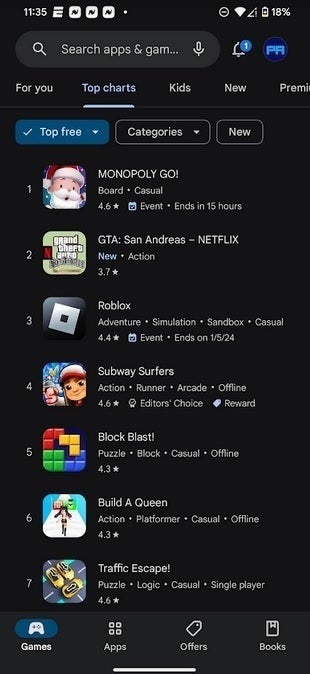Google nixed plan to lower Google Play Store Tax in 2021 fearing a huge drop in revenue

It was an epic lawsuit and it was an Epic lawsuit. Two weeks ago a federal jury found that the Google Play Store violated antitrust laws. Google's in-app payment processing platform and the process of distributing Android apps were both run as monopolies said the jury in Epic v. Google. Epic sued Google after the game developer was sent packing from the Play Store along with its popular Fortnite game after Epic promoted its own in-app payment processing system which violated Play Store rules.
According to a report published by Bloomberg, Google seriously considered changing the in-app payment processing platform from which it was taking 15% to 30% of in-app revenue. In 2021, Google considered an overhaul to the Play Store billing model which was called Project Everest. This was discovered in documents that were released as part of the Epic v. Google antitrust suit.
Google found itself in a tight spot. On one hand, it was worried that if it didn't make any change to the Play Store's in-app payment processing platform, it would be done in by regulatory overreach. On the other hand, making changes to the platform could seriously impact the company's revenue. During an in-house presentation, Google said, "We can defend the status quo for a few months. Making proposed changes sooner may help support reasonable legislation, position Google as a leader, and prevent more draconian legislation."

Google decided that Project Everest would cost Google too much money
Project Everest would have stopped Google from taking its 15% to 30% cut of in-app revenue and instead, developers would be charged for various services related to listing their apps in the Play Store with additional charges tacked on for user downloads and updates. But making this switch would cost Google in the form of a $1 billion to $2 billion decline in annual revenue from apps and $6 billion to $9 billion in revenue from games.
Google employees floated the idea of having app developers handle in-app payment processing themselves in exchange for paying Google a lower fee. Google calculated that this option would reduce annual Play Store revenue between $250 million and $1.3 billion.
Also two weeks ago, Google announced the terms of a settlement it made back in September with all 50 states, the District of Columbia, and two US territories for $700 million. After giving the states $70 million of the settlement for penalties, restitution, disgorgement, and fees, the remaining $630 million will be shared among Play Store customers who will get a minimum of $2 each.
More importantly, once a judge signs the settlement, Google could be forced to make changes to its Android app storefront. One possible change would give Play Store customers the ability to decide to have their in-app payments processed by Google or by a third-party firm listed by the app developer.
Follow us on Google News














Things that are NOT allowed:
To help keep our community safe and free from spam, we apply temporary limits to newly created accounts: